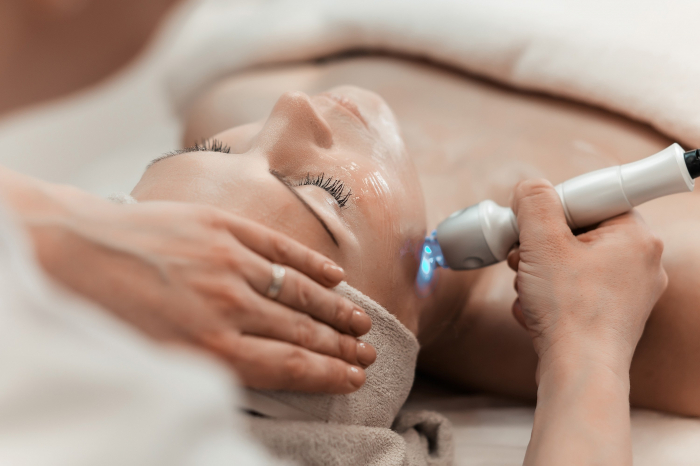Many factors such as the sun, heat, trauma to the skin, radiation and environmental pollution can speed up aging. Aging is a natural process and impossible to prevent completely, however, by taking good care of our skin, we can ensure that it preserves its health for many years to come and ages gracefully. Perhaps the worst mistake many of us make, especially in summer, is not protecting it from the sun's harsh rays and laying on sunbeds to fry our skin, according to dermatologists.
Dermatologist Şule Albayrak explained the 10 most common mistakes and habits that age the skin prematurely.
Not protecting yourself from the sun
Exposure to sunlight is by far the biggest factor that contributes to premature aging and skin cancer. Not being adequately and properly protected from the sun can lead to sunspots or discoloration in the skin, wrinkles, an increase in moles and cancerous growths.
Doctors warn that you should not be out under the sun between 10 a.m. and 4 p.m. when the sun's rays are the harshest. And remember, the sun rays can reflect off sand and asphalt and also have the same effect, even under an umbrella. Wear a daily sunscreen of at least 30 SPF and make sure it offers protection against both UVA (the rays that make us tan and also cause photoaging, aka wrinkles) and UVB (the rays that cause our skin to burn). If you go swimming, make sure to reapply your sunscreen afterward and top up every two hours, regardless of where you are. Also, do not try to mix your own sunscreen, a popular and dangerous trend on the rise fueled by the likes of Pinterest, and only buy dermatologically tested and approved products that offer you broad-spectrum (meaning both UVA and UVB) protection from reputable sellers.
Smoking
The second biggest factor that contributes to premature skin aging and the deterioration of collagen is smoking. All the harmful chemical substances cigarettes contain wreak havoc on the skin. For example, nicotine in cigarettes causes the blood vessels in the outermost layers of our skin to narrow, impairing blood flow. The lesser the blood flow, the less vital oxygen and nutrients the skin gets.
Smoking and being subjected to passive smoking can cause the skin to become dull, lackluster and discolored, and give the skin an overall "dirty" appearance as it disrupts the oxygenation process. It is also a great contributor to photoaging, leading to wrinkles and hyperpigmentation.
Not removing makeup properly
Cleansing the skin of all the dust, grime and dirt it has been exposed to throughout the day helps the skin function properly and repair at night.
Residues of makeup can clog pores and fill into fine lines throughout the night, causing deeper wrinkles, Albayrak said. Reminding that cleansing the skin and applying the appropriate care products at night was essential to achieve fresh, glowing skin, the dermatologist said this should become a habit.
For those who wear makeup and sunscreen daily, dermatologists recommend a two-step cleansing method – the first with an oil-based cleanser to break up the products and then a non-foaming, pH-balanced gentle cleanser to get rid of remaining residue.
Not drinking enough water
Drinking water is very important for our overall health, not just our skin. Not drinking enough water can cause us to become dehydrated, making the skin more sensitive to environmental aggressors and leading to premature wrinkles by disrupting cell repair. Make it a habit to drink at least eight to 10 glasses of water a day (about 2 liters or more) throughout the day to keep your skin and body healthy and functioning properly.
Not using moisturizer
Our skin reaches its peak in vibrancy and glow in our 20s, and starting in our 30s, signs of aging in the skin become more and more evident every decade. As the fat stores in our skin, which give it the glow we crave and provide moisture to the skin, decrease with age, it becomes normal for the skin to become drier and more sensitive over time.
For this reason and to keep skin balanced, moisturized and healthy, it is important to choose a moisturizer suitable for your skin type and age, and make sure to moisture twice a day.
Not eating well
Albayrak said that following a healthy and balanced diet full of fresh vegetables and fruits is one of the most important factors for overall skin health, noting that fried foods, artificial sauces loaded with sugar and processed foods with additives were all big contributors to faster aging.
“Eating fast food and sugary foods often increases oxidation of the skin and accelerates the aging process,” she said.
“Maintaining a Mediterranean diet rich in vegetables, fruits and unsaturated fatty acids, and consuming healthy oils via fish and nuts at least twice a week help the skin keep its shine and delay aging,” she added.
Losing or gaining weight fast too fast
Our skin is our largest and stretchiest organ, which gives it the ability to adapt to physical changes that occur in our bodies over time. However, gaining or losing weight quickly and suddenly can overwhelm the skin’s elasticity capacity to adapt, leading to stretch marks and sagging in our body as well as a loss of fatty tissue in our face and other areas in our body, creating a sunken appearance. Such deep tissue loss causes our skin to look older than it is.
Choosing wrong cosmetic procedures
“Cosmetic procedures performed at the right time and in the correct way can delay aging,” Albayrak stressed.
“Cosmetic procedures should be done in the appropriate season and at recommended intervals. However, skin tone and type are important in choosing the right cosmetic applications and procedures,” she said.
When choosing treatments for skin rejuvenation and laser types for anti-aging purposes, the person’s skin tone should be taken into account by the trained professional carrying out the procedure. Albayrak also noted that treatments should be planned according to the season, for example, leaving treatments that involve acids and lasers to winter months when most people won’t be spending as much time in the sun.
She also said the frequency of such procedures, especially more invasive peels, dermapen or microneedling procedures, should not be overdone, as that will do more harm than good.
Getting popular treatments done without a proper assessment of the skin’s needs and the patient’s medical history can cause rapid deterioration of skin quality, leading to blemishes and thinning of the skin, and therefore make the skin look older, she warned.
Using 'natural' products
Today, as with many products and the rise of fear-mongering about chemicals, it has become popular to prefer “natural” ingredients in skincare products. But here is a reminder: Everything on this Earth is made up of chemicals, even natural ingredients.
Swayed by “clean beauty” marketing and the war against chemicals, many people have been having bad experiences, such as burns, rashes and allergies, with natural products that have not been dermatologically tested or prepared by institutions or experts with clinical expertise. And as organic and natural claims made on labels do not have a set of clear rules or legislation that binds them, practically anyone could put that label on their product.
Not only could they be harmful and irritate the skill but they could also be counterfeit products and lead to all sorts of health problems. If you want to find the right products for your skin, consult trusted professionals and your dermatologist before anyone else.
DailySabah
More about:
















































